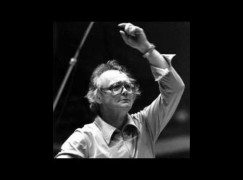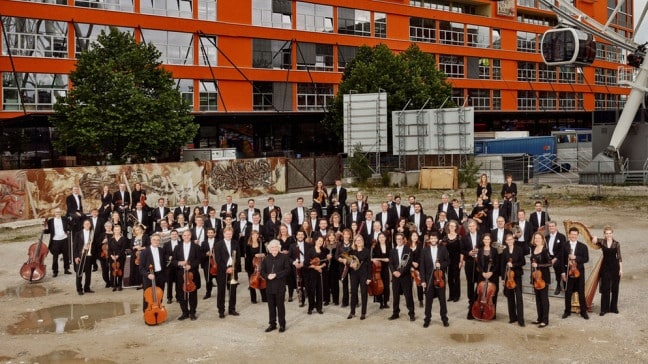The Slipped Disc daily comfort zone (313): I am the Egmont
mainWhen Beethoven met Goethe.
You won’t hear a more gripping reading than Tennstedt’s.


When Beethoven met Goethe.
You won’t hear a more gripping reading than Tennstedt’s.

He is already music director of the Metropolitan…

The tenor Ian Bostridge shocked Symphony Hall Birmingham…

The ARD competition has sacked Liang Wang, principal…

The conductor continues his agitation for a new…

Session expired
Please log in again. The login page will open in a new tab. After logging in you can close it and return to this page.
This is very special. Thank you for posting.
Trenchant.
Georges Prêtre
I did a long time ago……Georges Prêtre
A great performance, no doubt, but equalled by Furtwangler, Klemperer, and Szell. Nonetheless, thanks for the reminder.
Splendid! Do we know where this was recorded? Sounds too reverberent for the RFH – unless its been ‘doctored’.
Only saw him live once – Fidelio at the Met. But after the final scene of the opera I realized that I would never see another performance of it that could remotely improve on Tennstedt’s – so I never saw nor listened to it again – I can still hear the final ensemble from that night.
A noble overture, C minor, and the incidental music ,– Claerchen’s song, Egmont’l speech, his death, the uprising, overthrow of the tyrant, and triumphal coda.
Tennstedt is good, live, with a sound tempo and good horns. But the excellent is the enemy of the good. Memory serves up Weingartner and Szell with the VPO, and Furtwaengler with the BPO, both orchestras with their great weight of lower strings.
F minor
Another, more convincing reading for me, by Celibidache in 1950:
https://www.youtube.com/watch?v=BRqhDuNDiFk
“You won’t hear a more gripping reading than Tennstedt’s.”
This is in fact a great performance, but in my opinion, Furtwangler’s 1947 Egmont live with the BPO outgrips even Tennstedt.
Every reading of Tennstedt’s is gripping (!)
I consider myself blessed to be more broadly grippable than some people here.
Superb performance!
I was lucky enough to see Tennstedt in concert back in the eighties.
He was a wonderful conductor.
What a conductor he was…
Love Tennstedt’s music making. One of the greatest conductors ever, and not recognized often enough. This recording is one of the best out there, to be sure. (I like KT’s having all four horns help the bassoons, when the sarabande motif returns) and the closing pages of the Allegro con brio is as thrilling as you will ever hear it.
But there is so much to Beethoven’s Egmont overture that is often ignored, as is the case here, beginning with the opening sarabande, where the detached half notes are always played as quarter notes, deflating much of the anger Beethoven associates with the (normally stately) Spanish dance. And the only reason why strings play the figure wrong is because the conductor never asks (and it is much harder to conduct).
Or one in which the first note is less together. Why do only the horns play at first first?
I have numerous recordings of Egmont so I just pulled the first one I saw – Boult’s with the LPO on Vanguard. At a minute less than Tennstedt’s I found it more exciting, maybe not “gripping”, whatever that means. I would use the term “satisfying” for Boult’s, and maybe “boring” for Tennstedt’s. I am sure others would disagree.
I was lucky enough to play under Tennstedt back in the 1980s here in Chicago. He is definitely in the top three of all the conductors I have seen, and a gracious and kind human being as well. His Mahler First performance with the CSO is easily accessed on YouTube and highly recommended.
I remember my first experience with him was seeing his “Fidelio” at the Met when I was a freelancer in NYC. It was a stellar cast with John Vickers in his prime, yet the highlight was Tennstedt’s interpretation of the “Leonora 3” Overture before the last act. The Allegro seemed impossibly slow; I was sure he had miscalculated. Yet he held the tempo with an iron grip. The tension became almost unbearable. Finally, the coda exploded at a breakneck tempo, and it was all I could do not to scream from relief and joy.
Max, thank you for this! Tennstedt’s Mahler 1 with CSO is the standard. There are delicate passages where, after repeated viewings, I still don’t know what KT does, or how he does it (nor do my colleagues, when I show them). As for Leonore no. 3, my teacher was vehement about the tempo being ‘only Allegro’ — not ‘vivace,’ not ‘molto,’ not even ‘con brio,’ just “Allegro.” And yes, a giusto allegro makes the final presto even more thrilling.
I too was at one of those Met Fidelios with KT. My friend in the cellos said the orchestra adored him (almost as much as Kleiber). He didn’t want anything to do with meeting the press or doing interviews, “he just wanted to drink beer with those who liked beer.” Not American beer either “Horse-piss”…………your recollection of the Leonora Overture synchs with my own. I remember many wonderful concerts he gave with the Phillies and the NYPO including an absolutely gut-wrenching Mahler 6 that was even more intense than Bernstein in the same work. As a man who had helped dig bodies out of the Dresden blitz he knew what Mahler was about………….One of a handful of wonderful conductors who I miss very much.
SZELL
“Egmont” overture invites ragged entrances. There are even two slight anticipations of the beat in this fine performance by Tennstedt, one by the strings and one by the winds. Good to see al lthe mentions of Szell and Furtwaengler. .
Never with Prêtre. French precision
Wow, horns were definitely not late for the opening chord.
Too bad US orchestras aren’t allowed to play great works like this anymore since the opening of concerts are reserved as new music diversity slots.
I’ve lived many decades in the US but have been absent from the country for four years. I am astonished to learn of this development. In the past European composers of the 18th and 19th century were always overwhelmingly predominant in concert programming. When did this change take place? Are the old masters totally eliminated from programs or is a certain percentage of programming reserved to them? If it is a percentage, what is the approximate figure?
I’m sure what you say is true since most of the comments I read here with respect to more diverse programming tend to be measured, evidence-based statements and not exaggerated outbursts at social changes people dislike. However, what you say is so astonishing I would like to learn more.
Try Solti/Chicago on London LP CS 6800 (“Solti Chicago Showcase”) or Szell/Vienna (complete incidental music) with Pilar Lorengar, soprano, and Klaus-Jurgen Wussow, narrator, on London CD 448 593-2